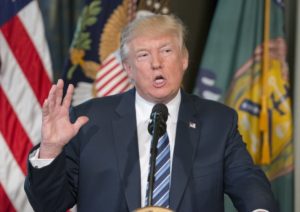by WorldTribune Staff, May 1, 2017
U.S. President Donald Trump is reaching out to leaders of Asian states to ensure “that we have everyone in line backing up a plan of action” to solve the North Korea crisis, White House Chief of Staff Reince Priebus said.
Priebus said Trump was in regular contact with Japanese Prime Minister Shinzo Abe and that the president had become “very close” to Chinese President Xi Jinping.

The Chinese Communist Party national strategy calls for excluding the United States from the geopolitical arena in the Far East, especially near its borders which includes one shared with North Korea.
The president also spoke to the prime ministers of Thailand and Singapore in separate phone calls about the North Korean threat and invited both of them to Washington, U.S. officials said, according to a Reuters report.
“They discussed ways to maintain diplomatic and economic pressure on North Korea,” one U.S. official said of the calls, speaking on condition of anonymity.
Trump spoke with Philippines President Rodrigo Duterte on April 29. Duterte was also invited to the White House.
“We need cooperation at some level with as many partners in the area as we can get to make sure that we have our ducks in a row,” Priebus told ABC’s “This Week” on April 30.
“So if something does happen in North Korea, that we have everyone in line backing up a plan of action that may need to be put together with our partners in the area,” he said. “We have got to be on the same page.”
Trump has stressed he would not broadcast military options to preserve an element of surprise. Secretary of State Rex Tillerson on April 28 said all options remained on the table.
Trump told CBS News that any trade disputes with China take a back seat to securing its cooperation on North Korea.
“Trade is very important. But massive warfare with millions, potentially millions of people being killed? That, as we would say, trumps trade,” Trump said in the “Face the Nation” interview.
H.R. McMaster, Trump’s national security adviser, was asked if Washington must respond to the latest test, especially after Vice President Mike Pence told allies during a trip to Asia last month that the “era of strategic patience is over.”
“Well, yes, we do have to do something,” McMaster said on “Fox News Sunday.” He said that may mean ratcheting up UN sanctions and also being prepared for military operations.
